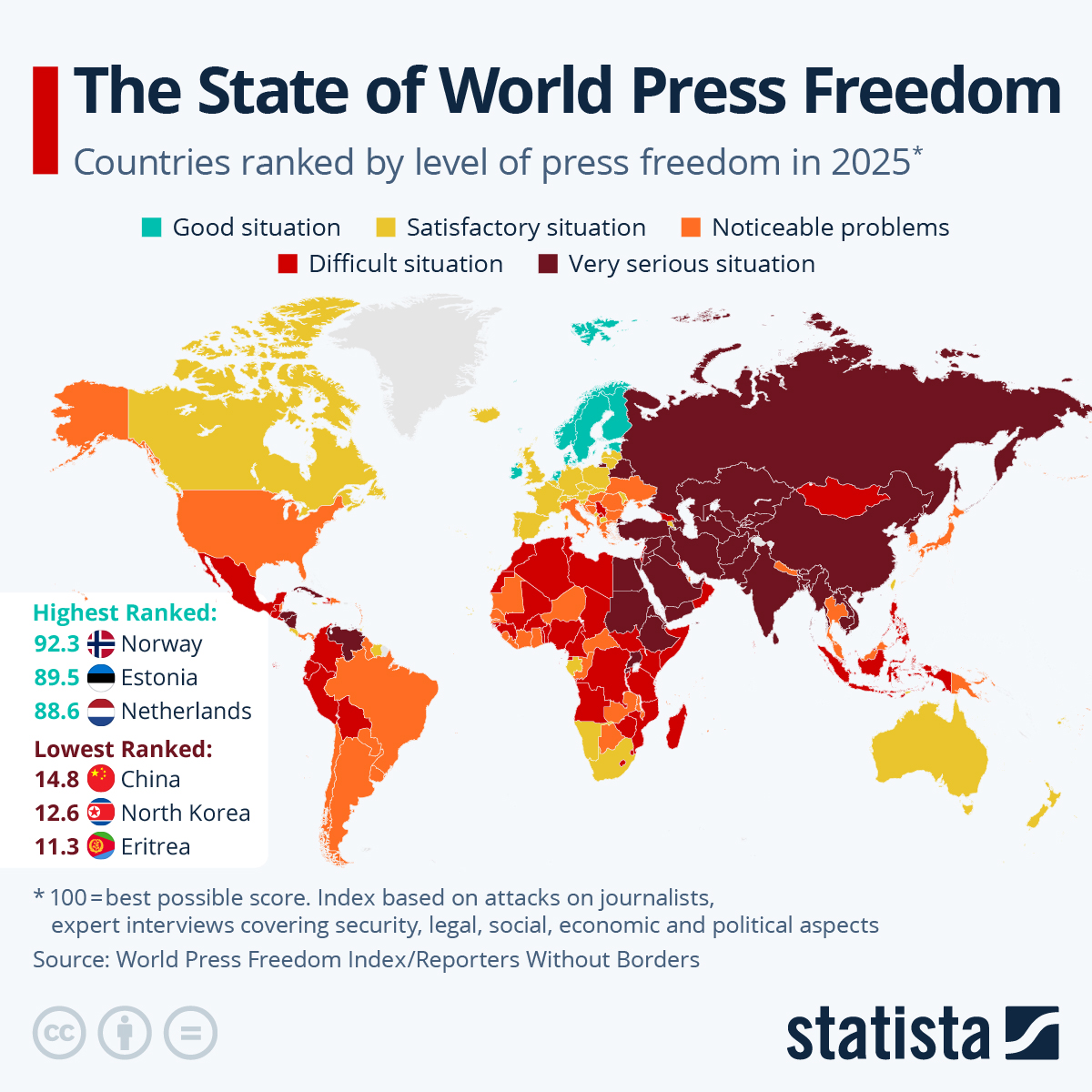Virtual ghost
Complex paradigm
- Joined
- Jun 6, 2008
- Messages
- 22,172

I would say, depending on what state you are in, that the US is between noticeable problems and difficult situation - especially for women, LGBTQ, POC and children.
This is first class disaster (and continuation of a downward trend that is going on for years).
In other words less than 1% of the world lives with really good media. While satisfactory ones has less than 10%.
I would say, depending on what state you are in, that the US is between noticeable problems and difficult situation - especially for women, LGBTQ, POC and children.
I was curious about why Canada scored lower than the Scandinavian countries. Since I am familiar with Canadian media (as a resident of the country), I had my guesses and took a closer look.This is first class disaster (and continuation of a downward trend that is going on for years).
In other words less than 1% of the world lives with really good media. While satisfactory ones has less than 10%.
I was curious about why Canada scored lower than the Scandinavian countries. Since I am familiar with Canadian media (as a resident of the country), I had my guesses and took a closer look.
The site ranks countries on five general categories. Here's how Canada did:
1) Political Indicator: Canada scored high, same color shade as top scorers (US scored one shade below)
2) Economic Indicator: Canada scored in the second shade below top scores (US scored the same)
3) Legislative Indicator: Canada scored in the second shade below top scores (US scored the same)
4) Sociocultural Indicator: Canada scored in the second shade below top scores (US scored the same)
5) Security Indicator: Canada scored high, same color shade as top scorers (US scored one shade below)
I would probably disagree with the lower score on the Legislative Indicator. I don't think the regulatory environment for journalists in Canada hampers them in any way. I agree with the other lower scores though. Newspapers and other media startups have a low chance of economic survival in Canada. This is particularly harmful as Canada has a well funded and dominant state broadcaster. This leads to bias. Also with the Sociocultural Indicator. Cancel culture is pronounced in Canada, and is especially restrictive on the state broadcaster. If they get on the wrong side of the masses, there is hue and cry which leads to government interference. So they have to sanitize everything for 'political correctness". Leads to obfuscation of the truth and a pronounced left wing bias.
While Canada continues to demonstrate a strong commitment to international press freedom protections and practices, there is more room for progress, particularly with regards to press coverage involving the rights of indigenous peoples and land disputes.
The Kremlin appears to be re-intensifying a reflexive control campaign targeting Western decision-making using nuclear threats and diplomatic manipulation. Reflexive control is a key element of Russia’s hybrid warfare toolkit — it is a tactic that relies on shaping an adversary with targeted rhetoric and information operations in such a way that the adversary voluntarily takes actions that are advantageous to Russia.[1] Soviet mathematician Vladimir Lefebvre defined reflexive control as “the process of transferring the reasons of making a decision” to an adversary via “provocations, intrigues, disguises, creation of false objects, and lies of any type.”[2] Russia has frequently used nuclear saber-rattling throughout the course of its full-scale invasion of Ukraine to cause the West (Russia’s self-defined adversary) to stop providing military support for Ukraine, and this nuclear saber-rattling has become a frequently used form of Russian reflexive control.[3]
Russian officials, particularly Medvedev, are critical elements of Russia’s efforts to use nuclear rhetoric as a form of reflexive control, as ISW has frequently reported.[9] Russian officials consistently time nuclear readiness exercises and vague threats of nuclear retaliation with important Western policy decisions regarding the war in Ukraine to force Western decision-makers to self-deter and temper their support for Ukraine. The current apparent resurgence of nuclear rhetoric, this time in the form of planned tactical nuclear weapons exercises, coincides with the imminent arrival of Western weapons in Ukraine. Russian officials are likely using the nuclear weapons information operation to discourage Ukraine’s Western partners from providing additional military support and to scare Western decision-makers out of allowing Ukrainian forces to use Western-provided systems to attack legitimate military targets in Russia. Russian troops engage in routine nuclear exercises as part of this wider nuclear rhetoric information operation, but ISW continues to assess that Russia is highly unlikely to use a tactical nuclear weapon on the battlefield in Ukraine or anywhere else.[10]
Hamas demands are ludicrous. They are negotiating a from a position of extreme weakness. All they have is hostages. I think about 130 are unaccounted for, and who knows how many are alive. That bit about exchanging dead bodies if they can't find live hostages is telling.
Hamas is willing to 'martyr' thousands of Gazan's because they are morally bankrupt. Yet they hope Israel is sufficiently moral to make massive concessions to save 100 or so people.
Hamas needs to be totally destroyed, so I hope Israel finishes this job. They should stop foot dragging though. Popular opinion keeps turning against them as the chaos drags on.
